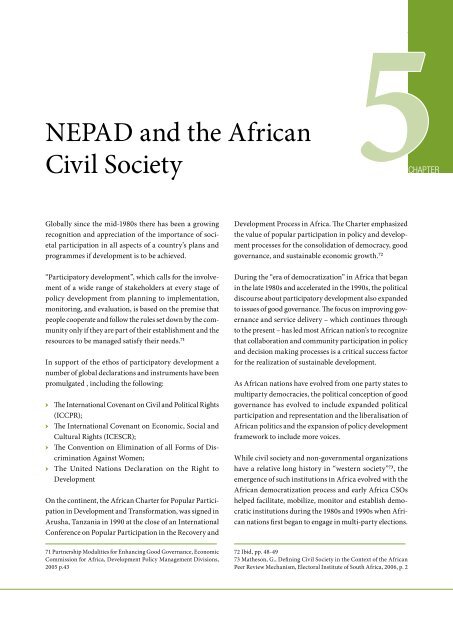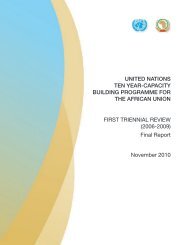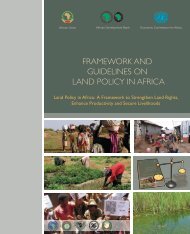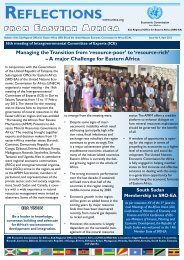A Decade of NEPAD - Economic Commission for Africa - uneca
A Decade of NEPAD - Economic Commission for Africa - uneca
A Decade of NEPAD - Economic Commission for Africa - uneca
Create successful ePaper yourself
Turn your PDF publications into a flip-book with our unique Google optimized e-Paper software.
<strong>NEPAD</strong> and the <strong>Africa</strong>n<br />
Civil Society<br />
Globally since the mid-1980s there has been a growing<br />
recognition and appreciation <strong>of</strong> the importance <strong>of</strong> societal<br />
participation in all aspects <strong>of</strong> a country’s plans and<br />
programmes if development is to be achieved.<br />
“Participatory development”, which calls <strong>for</strong> the involvement<br />
<strong>of</strong> a wide range <strong>of</strong> stakeholders at every stage <strong>of</strong><br />
policy development from planning to implementation,<br />
monitoring, and evaluation, is based on the premise that<br />
people cooperate and follow the rules set down by the community<br />
only if they are part <strong>of</strong> their establishment and the<br />
resources to be managed satisfy their needs. 71<br />
In support <strong>of</strong> the ethos <strong>of</strong> participatory development a<br />
number <strong>of</strong> global declarations and instruments have been<br />
promulgated , including the following:<br />
ӹ The International Covenant on Civil and Political Rights<br />
(ICCPR);<br />
ӹ The International Covenant on <strong>Economic</strong>, Social and<br />
Cultural Rights (ICESCR);<br />
ӹ The Convention on Elimination <strong>of</strong> all Forms <strong>of</strong> Discrimination<br />
Against Women;<br />
ӹ The United Nations Declaration on the Right to<br />
Development<br />
On the continent, the <strong>Africa</strong>n Charter <strong>for</strong> Popular Participation<br />
in Development and Trans<strong>for</strong>mation, was signed in<br />
Arusha, Tanzania in 1990 at the close <strong>of</strong> an International<br />
Conference on Popular Participation in the Recovery and<br />
71 Partnership Modalities <strong>for</strong> Enhancing Good Governance, <strong>Economic</strong><br />
<strong>Commission</strong> <strong>for</strong> <strong>Africa</strong>, Development Policy Management Divisions,<br />
2005 p.43<br />
559<br />
CHAPTER<br />
Development Process in <strong>Africa</strong>. The Charter emphasized<br />
the value <strong>of</strong> popular participation in policy and development<br />
processes <strong>for</strong> the consolidation <strong>of</strong> democracy, good<br />
governance, and sustainable economic growth. 72<br />
During the “era <strong>of</strong> democratization” in <strong>Africa</strong> that began<br />
in the late 1980s and accelerated in the 1990s, the political<br />
discourse about participatory development also expanded<br />
to issues <strong>of</strong> good governance. The focus on improving governance<br />
and service delivery – which continues through<br />
to the present – has led most <strong>Africa</strong>n nation’s to recognize<br />
that collaboration and community participation in policy<br />
and decision making processes is a critical success factor<br />
<strong>for</strong> the realization <strong>of</strong> sustainable development.<br />
As <strong>Africa</strong>n nations have evolved from one party states to<br />
multiparty democracies, the political conception <strong>of</strong> good<br />
governance has evolved to include expanded political<br />
participation and representation and the liberalisation <strong>of</strong><br />
<strong>Africa</strong>n politics and the expansion <strong>of</strong> policy development<br />
framework to include more voices.<br />
While civil society and non-governmental organizations<br />
have a relative long history in “western society” 73 , the<br />
emergence <strong>of</strong> such institutions in <strong>Africa</strong> evolved with the<br />
<strong>Africa</strong>n democratization process and early <strong>Africa</strong> CSOs<br />
helped facilitate, mobilize, monitor and establish democratic<br />
institutions during the 1980s and 1990s when <strong>Africa</strong>n<br />
nations first began to engage in multi-party elections.<br />
72 Ibid, pp. 48-49<br />
73 Matheson, G., Defining Civil Society in the Context <strong>of</strong> the <strong>Africa</strong>n<br />
Peer Review Mechanism, Electoral Institute <strong>of</strong> South <strong>Africa</strong>, 2006, p. 2







